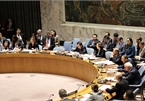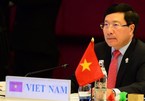At the regional level, Vietnam is holding the annual Chair of ASEAN, the main institution for regional cooperation and governance responsible for the wellbeing of 650 million people.
From global to local, this is Vietnam’s signature year when it can stamp its distinct vision and capabilities on the emerging landscape of foreign affairs. In terms of timing and suitability, the diplomatic high offices Vietnam is taking over could not have had a more deserving standard bearer.
Vietnam is riding high with sustained high Gross Domestic Product (GDP) growth of over 7 percent, the highest in ASEAN, as well as record levels of incoming Foreign Direct Investment (FDI) worth $30 billion in 2019. The frenetic pace at which new industrial projects and construction activities are springing up around the country is a visible sign for every visitor that Vietnam is booming under favourable global conditions and a robust domestic regulatory environment.
The trade war between China and the United States, which began when President Donald Trump came to power in 2017, has offered an unprecedented opportunity for manufacturing sector growth in Vietnam. Investors who are wary about outsourcing to mainland China have diverted funds to Vietnam. Companies from Japan, South Korea, Taiwan and China itself are setting up or expanding electronics and electrical equipment production in Vietnam, which enjoys friendly relations with the US and is hence a safer point of origin to export to the American market.
But Vietnam has far more going for it than the lucky ‘trade diversion’ from China due to the Trump factor. Vietnam’s underlying structural fundamentals are solid. With a population of 96 million, it is the third largest within ASEAN. Fertility rates had dipped below 2.0 at the turn of the millennium, but have now gone back up. The sight of innumerable tiny tots and newborn babies in public spaces across the country is a hopeful sign that Vietnam has the demographic basis to take it from middle income to high income status in the future.
Apart from economic strength, Vietnam also has the means to defend its sovereign interests. According to the 2019 Global Firepower rankings, Vietnam is the twenty-third most powerful military out of 137 nations, and the second strongest in ASEAN after Indonesia (ranked sixteenth).
The geopolitical location of Vietnam, which has a long seaboard overlooking vital waterways, is an asset for ensuring maritime peace. The very shape of Vietnam, looking like a drawn bow with ports like Da Nang, Nha Trang and Cam Ranh projecting into the central Indo-Pacific, matters for balance of power in the region.
At national memorials and monuments across Vietnam, the spirit of anti-imperialism is enshrined so that younger generations of Vietnamese remember that the fruits of the economic growth and security they enjoy today owe to the extraordinary sacrifice and genius of previous generations that endured superpower bombings and massacres.
In estimating the strategic capabilities of Vietnam, what matters more is not the formal numbers of how many battle tanks or submarines it possesses, but rather the spirit of independence and opposition to hegemony that its people have.
Knowledge that Vietnam, which used to be a ‘third world country’, defeated superpowers through will, determination and an unyielding sense of struggle is embedded in its contemporary society. That is why Vietnam will not kowtow to any new empire.
In international relations, it is theorised that small powers often have no option but to ‘bandwagon’ (accept a subordinate position) to big powers in order to survive. But unlike some weak ASEAN states, Vietnam has never ‘bandwagoned’ to Western or Asian masters.
Vietnam now is in a position to promote dialogue, ease tensions and confrontations, and seek fair, suitable solutions to issues that threaten regional and global peace and security, according to Deputy Prime Minister and Foreign Minister Pham Binh Minh.
Vietnam should enhance strategic cooperation with likeminded countries. Their joint economic connectivity projects and pooling of naval resources can send a subtle but unmistakable signal that Asian can take care of their own security problems without depending on the whims of extra-regional powers.
We are now in an economically interdependent second decade of the twenty-first century. Concepts like military alliances or coalitions for ‘hard counterbalancing’ of aggressive big powers are impractical and outdated. What is required instead is a loose ‘soft balancing’ regional architecture that is selective but not explicitly confrontational.
In the current day and age, the threat facing middle powers like Vietnam is not military invasion or physical occupation by a hegemonic state. Territorial defence is not the main problem. Rather, the challenge is erosion of sovereign spaces and squeezing out from natural spheres of influence through naval pressure tactics. If Vietnam enhances its maritime power projection capabilities in the East Sea and engages with groupings committed to stability in the broader Indo-Pacific, it will be a substantial contribution to peace.
Uncle Ho Chi Minh changed not just the fate of Vietnam and its neighbours but of entire world history. Vietnam’s leadership on the world stage in 2020 should be the harbinger of greater things to come. - VNS
Sreeram Chaulia
Sreeram Chaulia is a Professor and Dean at the Jindal School of International Affairs in Sonipat, India. His latest book is ‘Trumped: Emerging Powers in a Post-American World’

Vietnam chairs first meeting of ASEAN Committee in New York
The first meeting of the Association of Southeast Asian Nations (ASEAN) Committee was held in New York on January 10, focusing discussion on activities and priorities of ASEAN member states this year.

ASEAN Chairmanship: For a cohesive and responsive ASEAN
Advancing ASEAN’s contribution to maintaining regional peace, security and stability has been identified as one of five key priorities for Vietnam’s ASEAN Chairmanship 2020, wrote Deputy Prime Minister and Minister of Foreign Affairs Pham Binh Minh.
 2020 is a landmark year for Vietnam in the international arena. It is assuming a two-year-long non-permanent seat at the United Nations Security Council, which includes two months as president of the highest decision-making body of world politics.
2020 is a landmark year for Vietnam in the international arena. It is assuming a two-year-long non-permanent seat at the United Nations Security Council, which includes two months as president of the highest decision-making body of world politics.